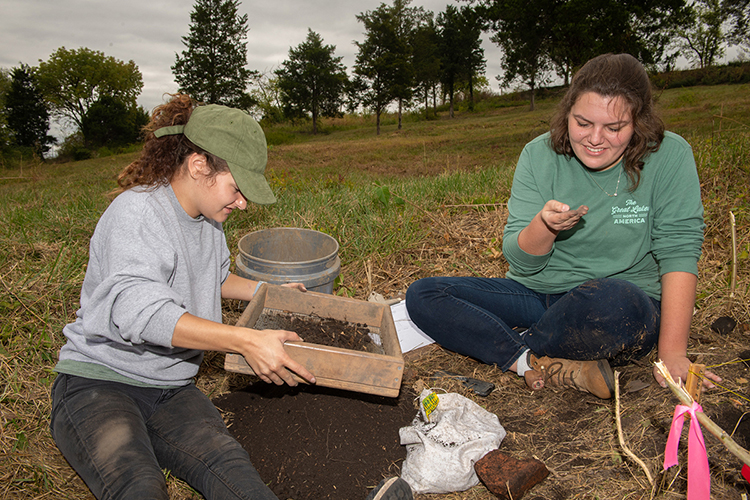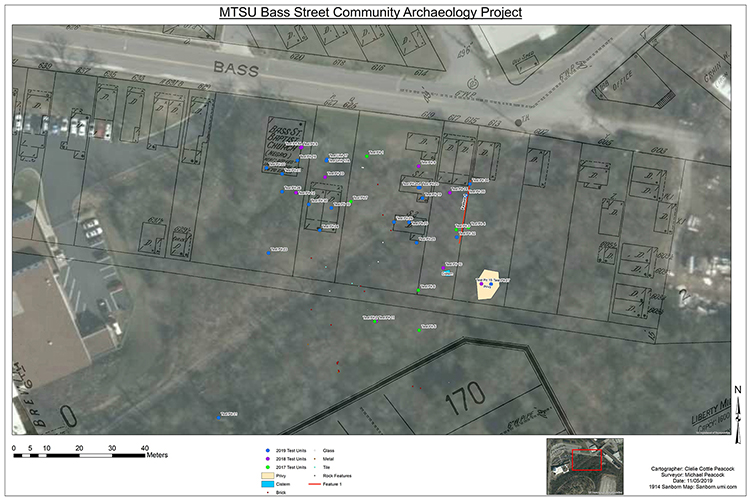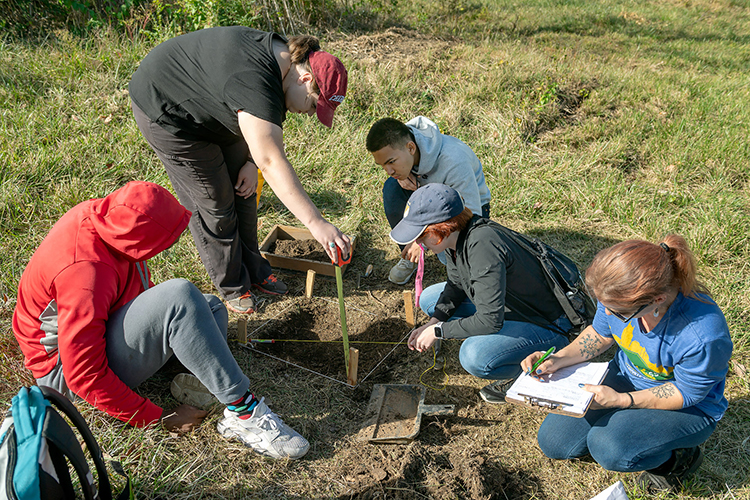NASHVILLE, Tenn. — MTSU students are unearthing an important chapter in Nashville history and American history — one small plot at a time.
Actually, Andrew Wyatt, an associate professor of archaeology in the Department of Sociology and Anthropology, started the Bass Street Community Archaeology Project, named for an important nearby thoroughfare in the African American community, in 2017. Since then, he and his students have spent time digging at Fort Negley Park, which became the site of one of the first post-Civil War black neighborhoods in Nashville.

Anna Yuhas, a sophomore forensic science major from Saulsbury, Tennessee, and Madeleine Laderoute, a graduate teaching assistant, sift through dirt for artifacts on the Bass Street Community Archaeology Project at Fort Negley in Nashville. (MTSU photo by James Cessna)
What is as stunning as the history itself is the fact that many of the students in the Archaeology 3210 class are not majors in the discipline and have had no previous experience on archaeological digs.
Helping Wyatt guide the neophytes are two young veterans of the professional process.
“Getting that practical experience, I think, is a key thing as part of the class because you don’t really know what archaeology is like until you start doing field work,” Peacock said.
Peacock’s husband, Michael, has experience as a land surveyor. He volunteers his time by using global positioning systems to locate coordination points on the property. She converts them to coordination points in her software.
“Anything that we can take points for, I can show on a map and be able to geospatially analyze it next to historic maps,” Peacock said.
Madeleine Laderoute is a graduate teaching assistant who helps Wyatt teach the class, assists in the lab and helps students excavate 50-by-50-centimeter units inside Fort Negley Park. Students screen all dirt for even the smallest artifacts. She said the historical significance of the dig is quite substantial.
“There is not a lot of archaeology of African Americans in the South post-emancipation,” Laderoute said. “For that reason, this site is unique in that this is one of the first free black communities in the city of Nashville.”

A 1914 map by the Sanborn Insurance Company is juxtaposed with areas of excavation in the Bass Street Community Archaeology Project since 2017. Clelie Cottle Peacock, an MTSU geographic information systems technician, created the map. (Photo submitted)
More than 500 escaped slaves worked to build Fort Negley on what was then Union-occupied territory in a Confederate state. After the war, the African Americans created one of the earliest free black neighborhoods in Nashville there.
“The stone foundation of the church is still there,” Wyatt said. “We also have a foundation for one of the houses that we can see, and we have dug around.”
In the 1930s, the federal government took over the land to rebuild the fort, which had fallen into disrepair, and to create a park. Therefore, artifacts recovered on the site encompass several different time spans.
Wyatt said some of the artifacts include square-cut nails, which were manufactured individually and used to build houses until the early 1800s, bottles from the 1940s and ceramics from different sets, indicative of people who could not afford complete sets of china.

MTSU students measure an archaeology unit and document their work during an Oct. 19, 2019, dig at the Bass Street Community Archaeology Project in Nashville. Pictured, from left, are Julius King, Autumn Lovell, Lar May, Olivia Thompson and Kathryn Miller. (MTSU photo by James Cessna)
The students will suspend their digging for the spring 2020 semester since Wyatt will be teaching other classes. Both Peacock and Laderoute say that will give them a chance to get caught up with mapping and with cataloguing the artifacts that have been uncovered so far.
“This is an opportunity to teach students about archaeology, not just how to do it, but what it means,” Wyatt said. “This is an historically significant site. They’re learning, hands-on, an important part of Nashville history.”
Some of the artifacts ultimately will be displayed in the Fort Negley visitors’ center, but the project will continue for the foreseeable future, resuming excavations by students with the fall 2020 semester.
For more information about MTSU’s archaeology classes, go to https://www.mtsu.edu/programs/anthropology/index.php. To learn more about the Bass Street Community Archaeology Project at Fort Negley, contact Wyatt at 615-904-8487 or andrew.wyatt@mtsu.edu.
Fort Negley Park is located at 1100 Fort Negley Blvd. in Nashville. For more information, call 615-862-8470.
— Gina Logue (gina.logue@mtsu.edu)
Top image: MTSU students work in one of the archaeological units during an Oct. 19, 2019, dig at the Bass Street Community Archaeology Project in Nashville. Pictured, from left, are Joshua Shell, Jasmine Elliott and Noah Seifert. (MTSU photo by James Cessna)














